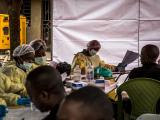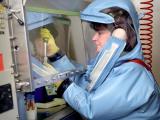Jun 15, 2011 (CIDRAP News) A federal advisory committee is recommending that 11 bacterial species and viruses on the current "select agent" list, including anthrax and Ebola virus, be singled out for special safeguards and that another 19 agents be dropped from the list entirely.
The committee is also calling for various screening and monitoring steps to ensure the reliability of personnel who conduct research on select agents and toxins, along with measures to improve computer security.
The recommendations are for the National Select Agent Program (SAP), which regulates the possession, use, and transfer of biological agents and toxins that are used in some US laboratories and are deemed to pose a risk of exploitation by terrorists.
The recommendations are intended "to better align laboratory security measures for biological agents and toxins with the risk each might pose to the United States if used in a terrorist attack," the Department of Health and Human Services (HHS) said in a press release yesterday.
Current regulations require the same security measures for all 82 agents and toxins on the select agent list, HHS said.
"The members of the panel believe strongly that biological select agents and toxins work is crucial to national security, said George Korch, PhD, panel co-chair for HHS and the HHS acting deputy assistant secretary for preparedness and response. The measures recommended by the panel represent best practices for personnel and physical security developed to increase security without unduly burdening the regulated community.
The advisory group, called the Federal Experts Security Advisory Panel (FESAP), was created by a presidential order in July 2010. The move came in response to federal and nonfederal reports on biosecurity and after the FBI concluded that government scientist Bruce Ivins probably perpetrated the 2001 anthrax letter attacks, according to HHS.
The presidential order required the designation of a subset of select agents that pose the greatest risk for misuse leading to mass casualties or devastating effects on the economy and public confidence, according to the report.
The panel picked the following 11 agents for this "Tier 1" classification:
- Bacillus anthracis (anthrax)
- Burkholderia mallei
- Burkholderia pseudomallei
- Ebola virus
- Foot-and-mouth disease virus
- Francisella tularensis (the cause of tularemia)
- Marburg virus
- Variola major (smallpox) virus
- Variola minor virus (a milder strain of smallpox)
- Yersinia pestis (the cause of plague)
- Botulinum toxin and Clostridium botulinum species that produce it
The panel picked 19 agents for deletion from the list because of "their diminished risk for use in a high-consequence event," the HHS statement said.
The committee recommended six other toxins for eventual removal from the list, saying other regulatory controls over their possession should first be identified and confirmed. The panel also said it decided not to put the severe acute respiratory syndrome (SARS) virus on the list.
The panel suggested a number of measures to guard against misuse of select agents by lab workers. Some examples:
- For foreign nationals who request access to Tier 1 agents, the Department of Justice should look into the feasibility of obtaining the same level of criminal background check as is done on US citizens.
- If possible under statutory authority, the SAP should require credit checks to assess workers' financial responsibility.
- Once personnel are granted access to select agents, their reliability should be monitored on an ongoing basis through steps such as checking their credit and criminal status.
HHS and the US Department of Agriculture, which together manage the SAP, will consider the panel's recommendations, HHS officials said. Any changes in the program will be announced and public comments invited this coming fall.
See also:
Jun 15 HHS release
FESAP recommendations


















